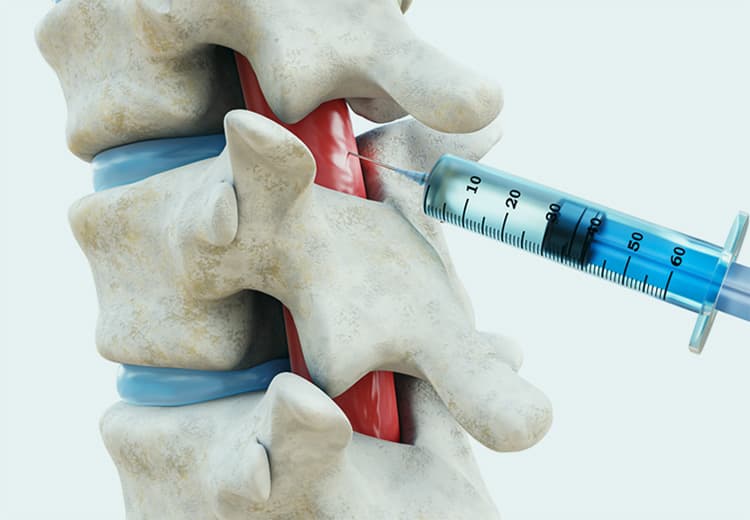Anti-Inflammatory Epidural Back Injections
Epidural injections are a minimally invasive treatment option designed to reduce inflammation and relieve pain in the spine. These injections deliver a powerful anti-inflammatory medication—typically a corticosteroid—directly into the epidural space around the spinal nerves.
This treatment is commonly used for conditions such as herniated discs, sciatica, spinal stenosis, or other sources of nerve irritation. By targeting inflammation at the source, epidural injections can help reduce pain, improve mobility, and in some cases, delay or avoid the need for surgery.

Cervical, Thoracic, Lumbar, Caudal Epidural Steroid Injection
What is it?
Epidural steroid injections deliver anti-inflammatory medication directly into the epidural space around the spinal cord to treat pain and inflammation from herniated discs, spinal stenosis, or other spine conditions.
How is it performed?
Using fluoroscopic guidance, your physician will direct a small needle into the epidural space and inject a combination of steroid and local anesthetic. The procedure takes approximately 15-30 minutes depending on the location.
Keypoint #1-Lorem Ipsum
Lorem Ipsum mon fringilla dolor felis amet fusce.
• Libero auctor
• Enim molestie iaculis
• Massa bibendum
• Ultrices varius
Metus euismod tellus penatibus in ex morbi euismod mollis.
Phasellus venenatis augue luctus sollicitudin elementum suspendisse.
Treatment Benefits
This non-surgical approach can significantly reduce inflammation and nerve irritation, leading to noticeable pain relief. Many patients experience improved mobility, better sleep, and an enhanced ability to participate in physical therapy or daily activities. While results may vary, some people feel relief within a few days, and the effects can last for several weeks to months.
Who Can Benefit from This Treatment?
This treatment is often recommended for patients experiencing lower back or neck pain that radiates into the arms or legs, particularly if the pain hasn’t responded well to conservative treatments like medication or physical therapy. A thorough evaluation with imaging studies helps determine whether an epidural injection is an appropriate option based on your symptoms and spine condition.
Learn more about anti-inflammatory epidural injections by contacting the Minimally Invasive Spine and Pain Institute—our team is here to help you explore your options.
Aftercare for Anti-Inflammatory Epidural Injections
Following your injection, it’s normal to experience mild soreness at the injection site or a temporary increase in symptoms before the medication begins to take effect. Most patients can return to light activities the same day, but it’s important to follow any specific instructions provided by your physician. Full relief may take several days as the anti-inflammatory medication reduces irritation around the spinal nerves.
Tips for a Smooth Recovery
To support a safe and comfortable recovery, keep the following aftercare tips in mind:
Take it easy for the rest of the day; avoid strenuous activity or heavy lifting.
Apply ice packs to the injection site if you experience soreness or swelling (20 minutes at a time).
Monitor for any unusual symptoms, such as fever, severe headache, or signs of infection, and report them to your physician immediately.
Resume medications as directed by your healthcare provider.
Follow up with your provider to evaluate how well the injection is working and discuss next steps in your treatment plan.

